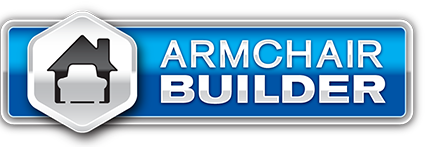Owner Builder Disclosure Statements: What are they?
Many municipalities throughout the U.S. use something called Owner Builder Disclosure Statements to protect homeowners, or future homeowners, from unlicensed contractors. It’s a document that owner builders must sign when they go to the local building department to pull an owner builder permit. What kinds of things are these local governments trying to protect people from with this statement? Possible bad outcomes include shoddy workmanship, contractors working without insurance exposing landowners to big potential liabilities, nonpayment of taxes by contractors,…etc. All of these things can be extremely scary to potential owner builders so let’s take a look at some actual Owner Builder Disclosure statements and talk through how an owner builder can protect themselves.
Work must be done by a licensed contractor. Since you have made it to Armchair Builder, you probably are already familiar with the term owner builder. Unfortunately many people out there don’t know that it entails the homeowner taking full control and responsibility for their building project. So some unsuspecting and unknowing homeowners might be coerced by an unlicensed building contractor to pull the permit for a new project as an owner builder even though the contractor plans on taking on the full project for the homeowner. This is not a good thing. If the contractor is telling the homeowner they are in charge of the entire project then the contractor should never ask the homeowner to pull the permit as an owner builder. So, never let this happen to you. If you are not in charge of the project then never pull an owner builder permit.
Homeowner acknowledges that they are taking full responsibility for the project. When pulling a permit as an owner builder, the owner has full responsibility for the outcome of the project. This includes the budget, safety, quality, schedule,…basically everything. This sounds scary. However, keep in mind, owner builders hire people to help them where they are lacking knowledge or time. Sometimes an architect is hired to perform quality as-built inspections throughout the schedule, or maybe a local general contractor is paid hourly to ensure the daily schedule is met. The owner builder can and should get help wherever it might be needed.
The property cannot be sold or leased for a period of one year after construction is complete. This language is to prevent house flippers or small builders from skirting the normal requirements in order to make a quick profit.
Homeowner must provide direct onsite supervision of the project. I honestly can’t think of a situation where an owner builder wouldn’t want to provide direct onsite supervision of their project. Even if the owner is too busy to make daily visits to the job site, a representative should be there on the owner’s behalf. Too many things can go wrong on a construction site for it to be left without daily management supervision. And by management, we are referring not to subcontractors, but a person designated as the supervisor for the schedule and quality of the entire project.
Homeowner cannot hire an unlicensed contractor and the homeowner must verify that all contractors are properly licensed. The owner builder’s subcontract agreement (reviewed by the owner builder’s attorney) that will be executed with subcontractors should state that each company working on the property must supply proof of license and insurance. This will prevent any unlicensed companies from being hired.
Homeowner acknowledges the financial risk for any injuries sustained by an unlicensed contractor or their employees while working on the property. As mentioned above, the owner builder will require each subcontractor to supply proof of insurance that is up to date. In addition, the owner builder will have their own insurance covering the project. Typically the owner builder’s general liability insurance agency will provide the owner builder with a list of requirements for subcontractors including any additional insured amounts.
Homeowner acknowledges that they are responsible and at financial risk for all federal income tax and social security contributions if they hire an unlicensed contractor. As we all know, everyone in the U.S. is required to pay income tax and payroll tax. Hiring a company that is unlicensed can leave the owner builder exposed to those liabilities. Owner builders should make certain there is language in the subcontract agreements protecting them from this issue.
These Owner Builder Disclosure Statements might be scary but they are a good thing. It’s very important for unsuspecting homeowners to know that pulling an owner builder permit for an unlicensed contractor is never a good thing. At the same time, it’s always good to remind the owner builders one last time that ultimately, they are in responsible for all outcomes associated with the building project.

